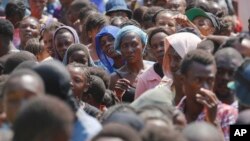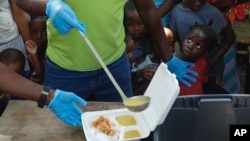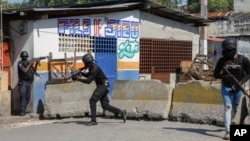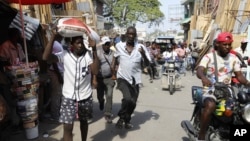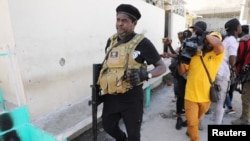A crowd of about 100 people tried to shove through a metal gate in Haiti's capital as a guard with a baton pushed them back, threatening to hit them. Undeterred, children and adults alike, some of them carrying babies, kept elbowing each other trying to enter.
"Let us in! We're hungry!" they shouted on a recent afternoon.
They were trying to get into a makeshift shelter in an abandoned school. Inside, workers dipped ladles into buckets filled with soup that they poured into Styrofoam containers stuffed with rice to distribute to Haitians who have lost homes to gang violence.
About 1.4 million Haitians are on the verge of famine, and more than 4 million require food aid, sometimes eating only once a day or nothing at all, aid groups say.
"Haiti is facing a protractive and mass hunger," Jean-Martin Bauer, Haiti director for the United Nations' World Food Program, told The Associated Press. He noted that Croix-des-Bouquets, in the eastern part of Haiti's capital, "has malnutrition rates comparable with any war zone in the world."
Bauer and other officials said that the gangs are blocking distribution routes and paralyzing the main port, and that WFP's warehouse is running out of grains, beans and vegetable oil as it continues to deliver meals.
Only a few aid organizations have been able to restart since Feb. 29, when gangs began attacking key institutions, burning police stations, shutting down the main international airport with gunfire and storming two prisons, releasing more than 4,000 inmates.
Transitional council
The violence forced Prime Minister Ariel Henry to announce early Tuesday that he would resign once a transitional council is created, but gangs demanding his ouster have continued their attacks in several communities.
A plan to create a transitional presidential council is moving forward. Most of the Haitian parties and coalitions submitted the names of those charged with finding new leaders for the country, Caribbean officials said earlier this week.
“It is all up now to the Haitians as they are the ones who want a Haitian-led solution,” Surinamese Foreign Minister Albert Ramdin told The Associated Press. “We hope this is a breakthrough for Haiti.”
However, Jean-Charles Moïse, who leads the Petit Desalin party and has allied with former rebel leader and convicted money launderer Guy Philippe, has said his party would not join the council.
It wasn’t immediately clear what would happen to the position rejected by Moïse.
On Saturday, the U.S. State Department said it is arranging a charter flight for Americans who want to leave Haiti. They must have a valid U.S. passport and fill out a form on the department’s website.
The flight is to leave from Cap-Haitien on Haiti’s northern coast, and travel to Cap-Haitien is at passengers’ own risk.
‘Look where I end up’
Inside the makeshift shelter at the school, things were a bit more orderly, with scores of people standing in line for food. More than 3,700 shelter residents compete for a place to sleep and share a hole in the ground for a toilet.
Marie Lourdes Geneus, a 45-year-old street vendor and mother of seven children, said that gangs chased her family out of three homes before they ended up at the shelter.
"If you look around, there are a lot of desperate people who look like me, who had a life and lost it," she said. "It's a horrible life I'm living. I made a lot of effort in life and look where I end up, trying to survive."
She said she occasionally ventures out to sell beans to buy extra food for her children — who sometimes eat only once a day — but ends up being chased by armed men, spilling her goods on the ground as she runs.
Erigeunes Jeffrand, 54, said that he used to make a living selling up to four wheelbarrow-loads of sugar cane a day, but that gangs recently chased him and his four children out of their neighborhood.
"My home was completely destroyed and robbed," he said. "They took everything I have. And now, they're not even letting me work."
He sent his two youngest children to live with relatives in Haiti's more quiet countryside, while the two eldest live with him at the shelter.
"Can you believe I had a home?" he said. "I was making ends meet. But now, I'm just depending on what people provide me to eat. This is not a life."
Violence, little food
More than 200 gangs are believed to operate in Haiti, with nearly two dozen concentrated in Port-au-Prince and the surrounding areas. They control 80% of the capital and are vying for more territory.
Scores of people have died in the most recent attacks, and more than 15,000 have been left homeless.
The situation has prevented aid groups from operating at a time when their help is needed the most.
The U.S. Agency for International Development said that around 5.5 million people in Haiti — nearly half the population — need humanitarian aid and pledged $25 million in addition to the $33 million announced earlier this week.
The WFP's Bauer said the humanitarian appeal for Haiti this year is less than 3% funded, with the U.N. agency needing $95 million in the next six months.
"Conflict and hunger in Haiti are moving hand-in-hand," he said. "I'm frightened about where we're going."




